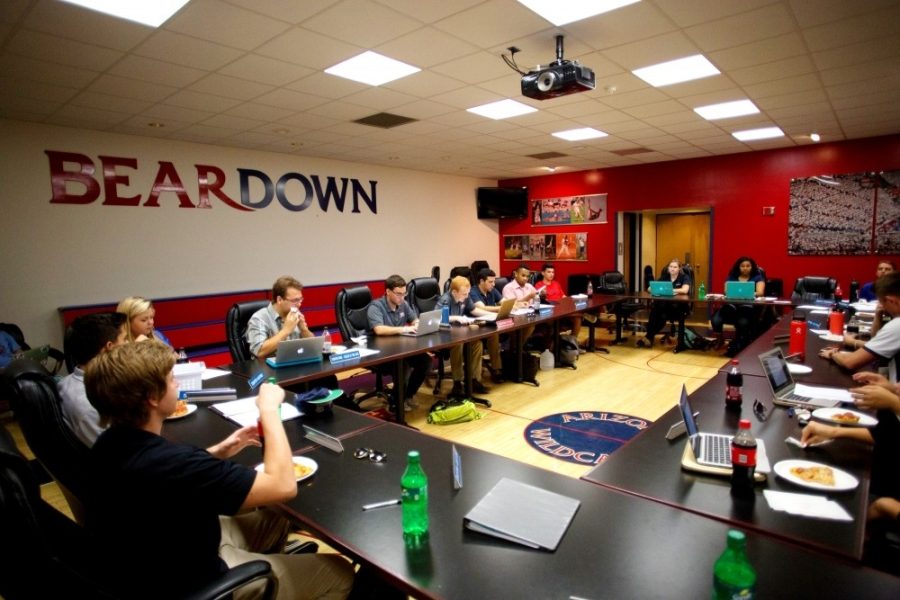The Associated Students of the University of Arizona 2016-2017 elections code was problematic for candidates in the recent election.
The code’s rules are designed by ASUA senators, written by the ASUA elections commissioner and reviewed by an appointed ASUA attorney to clarify terminology that may be problematic, according to Chloé Durand, ASUA elections commissioner.
During their campaigns, ASUA President-elect Matt Lubisich and his competitor Stefano “Salt” Saltalamacchia, experienced issues concerning clarity and consistency within the code.
“The document is very convoluted, and it’s also not easy to read,” Saltalamacchia said. “It’s inconsistent, and the turnover rate for who interprets the document every year is rapid.”
According to Lubisich, who received three overturned strikes in the election, the rules within the code are generally easy to understand.
“I’m not a huge fan of the three-strike system, and I think that part of the code needs to be rewritten,” he said. “A strike for postering should be way different than campaigning door-to-door off-campus.”
However, the three-strike system was put in place by ASUA senators.
RELATED: Lubisich rises through ranks to ASUA presidency
“There needs to be an outside entity overseeing how ASUA runs during elections,” Saltalamacchia said.
According to Durand, if students wish to appeal or add anything to the elections code, they can express their opinions to ASUA senators who are “open to suggestions.”
“Students can go to senators and talk to them about the issues,” she said. “They vote for the senators, who in turn vote for things that go into the code.”
Saltalamacchia said those who interpret the code also have a conflict of interest.
“We have members of the election commission who are potentially going to get reappointed,” he said. “They’re potentially keeping or losing their job, and that’s a conflict of interest.”
Durand explained statutes within the code are democratically voted on.
“The code is usually revised each year for things that we find become issues,” she said. “All the strike systems are based on statutes in the code.”
The ASUA elections code strike system is based on statutes of the code, according to Durand.
“When a candidate makes a correctable mistake and corrects it within a 24-hour period, they won’t receive a strike,” she said. It’s when a candidate makes an “uncorrectable” mistake that gets them a strike.
During the most recent election when Lubisich recorded a Facebook Live video, allegedly in the UA Main Library, Lubisich deleted the video and the ASUA Elections Commission dismissed the complaint, though users may have already viewed the video by that time.
RELATED: ASUA Supreme Court dismisses Saltalamacchia’s appeal, Lubisich indisputable president
According to Lubisich, there is a “gray area” of what is considered correctable.
“That part is confusing for candidates,” he said. “It needs to be rewritten.”
Another issue arose regarding slating when a flier was handed out on campus containing the names of three candidates.
Candidates are not allowed to run in conjunction with one another. A similar post was made on a private Facebook account, however the Elections Commission determined the post online was not in violation of the code, ruling that the post was a collage of posters and not an individual poster.
According to Saltalamacchia, the person who made the post was affiliated with Lubisich’s campaign.
Durand said the same rules do not apply to campaign members distributing physical campaign materials and online content, noting the inconsistency.
“We should probably revise that in the code,” she said.
Before election cycles, the Elections Commission shows the candidates presentations going over potentially confusing rules.
“I made myself available to candidates who had any questions about the code,” Durand said. “I would hope that if they were confused they would have come and talked to me because we did make ourselves available.”
The strikes, however, are determined by those on the Elections Commission and are open to interpretation, Saltalamacchia said.
In the most recent election, Saltalamacchia received a strike for campaigning in the Women’s Resource Center housed in the UA Main Library. The commission determined it was a violation, despite Saltalamacchia’s understanding that it was a cultural center.
Saltalamacchia and Lubisich both agreed the elections code has its problems.
“Regardless of the offense, a candidate will get a strike,” Lubisich added. “I think it should be up to the elections commissioner to add a spectrum of severity to each complaint that comes in.”
Follow Jessica Blackburn on Twitter.








